
Heinrich Wilhelm "Heinz" Rühmann was a German film actor who appeared in over 100 films between 1926 and 1993. He is one of the most famous and popular German actors of the 20th century, and is considered a German film legend. Rühmann is best known for playing the part of a comic ordinary citizen in film comedies such as Three from the Filling Station and The Punch Bowl. During his later years, he was also a respected character actor in films such as The Captain from Köpenick and It Happened in Broad Daylight. His only English-speaking movie was the 1965 Ship of Fools.
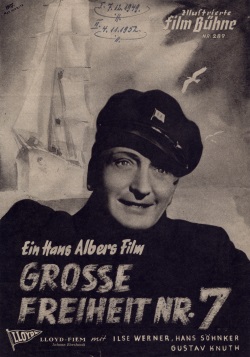
Große Freiheit Nr. 7 is a 1944 German musical drama film directed by Helmut Käutner. It was named after Große Freiheit, a street next to Hamburg's Reeperbahn road in the St. Pauli red light district.

The Man Who Was Sherlock Holmes is a 1937 German mystery comedy film directed by Karl Hartl and starring Hans Albers, Heinz Rühmann and Marieluise Claudius.

Water for Canitoga is a 1939 German western film directed by Herbert Selpin and starring Hans Albers, Charlotte Susa and Josef Sieber. The film is a "Northern", set in Canada in 1905 where an engineer is working to construct a new water supply system despite repeated attempts at sabotage. It is based on a play by Hans Rehfisch, Otto Eis and Egon Eis.
Werner Schott was a German actor.
Werner Fuetterer was a German film actor. He appeared in nearly 100 films between 1925 and 1967.
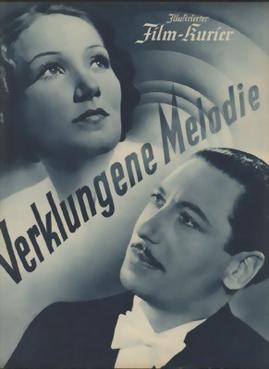
Faded Melody is a 1938 German drama film directed by Viktor Tourjansky and starring Brigitte Horney, Willy Birgel and Carl Raddatz. The film was made by Germany's largest studio of the era UFA. It was shot at the Babelsberg Studios in Potsdam and on location in French Algeria, New York City and Berlin. The film's sets were designed by the art directors Hermann Asmus and Max Mellin. It premiered at Berlin's Gloria-Palast.
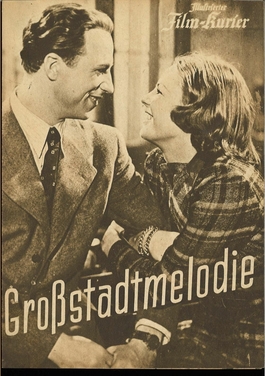
Melody of a Great City is a 1943 musical drama film directed by Wolfgang Liebeneiner and starring Hilde Krahl, Werner Hinz and Karl John. A young woman moves to Berlin to work as a press photographer.
Diesel is a 1942 German biographical film directed by Gerhard Lamprecht and starring Willy Birgel, Hilde Weissner, and Paul Wegener. It portrays the life of Rudolf Diesel, the German inventor of the diesel engine. It was one of a series of prestigious biopics made in Nazi Germany portraying genius inventors or artists struggling against the societies in which they live. The film was based on a biography by Eugen Diesel, one of Diesel's children.
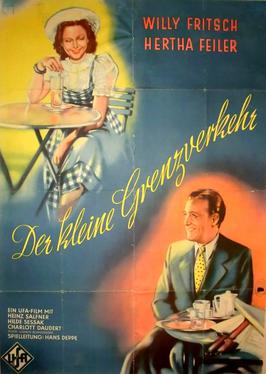
A Salzburg Comedy or Little Border Traffic is a 1943 German comedy film directed by Hans Deppe and starring Willy Fritsch, Hertha Feiler and Heinz Salfner. Erich Kästner wrote the screenplay based on one of his own novels. As he had been blacklisted by the Nazi Party, he used the pseudonym Berhold Bürger. The novel was again adapted for the 1957 film Salzburg Stories.
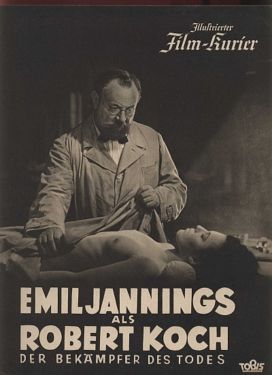
Robert Koch is a 1939 Nazi propaganda film directed by Hans Steinhoff and starring Emil Jannings, Werner Krauss and Viktoria von Ballasko. The film was a biopic of the German pioneering microbiologist Robert Koch (1843–1910). It was shot at the Johannisthal Studios in Berlin and premiered at the city's Ufa-Palast am Zoo. The film was made by the Tobis Film company, and was also distributed in the United States by the largest German studio UFA.
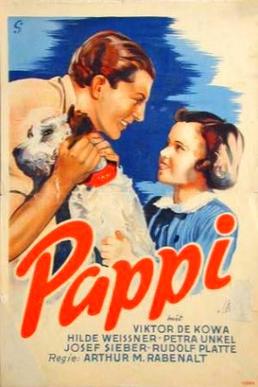
Pappi is a 1934 German comedy film directed by Arthur Maria Rabenalt and starring Viktor de Kowa, Hilde Weissner and Petra Unkel. It is part of the circus film genre.

Wrath of the Seas or When Fleet Meets Fleet is a silent war film released in 1926. Directed by Graham Hewett and Manfred Noa and starring Bernhard Goetzke, Agnes Esterhazy and Nils Asther. It portrays the Imperial German Navy during the First World War, particularly the Battle of Jutland and is based on a novel written by Helmut Lorenz.

Vienna, City of My Dreams is a 1957 Austrian musical comedy film directed by Willi Forst and starring Adrian Hoven, Erika Remberg and Hertha Feiler.

The Noltenius Brothers is a 1945 German drama film directed by Gerhard Lamprecht and starring Willy Birgel, Karl Mathias and Hilde Weissner. Released in Berlin on 7 April, it was, by most accounts, the last of the twelve films released in Nazi Germany in 1945, before capitulation on 7 May.

Beloved Enemy is a 1955 West German historical drama film directed by Rolf Hansen and starring Ruth Leuwerik, Werner Hinz and Thomas Holtzmann. The film's plot was loosely inspired by the Fashoda Incident of 1898.
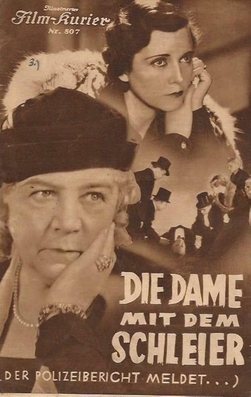
Police Report is a 1934 German mystery crime film directed by Georg Jacoby and starring Olga Chekhova, Paul Otto and Hansi Niese. It was adapted from the 1932 novel Die Frau im schwarzen Schleier by Hedda Lindne.
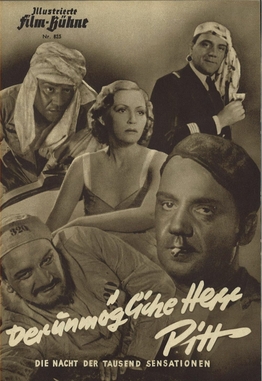
The Impossible Mister Pitt is a 1938 German adventure crime film directed by and starring Harry Piel. It also features Willi Schur, Leopold von Ledebur and Hilde Weissner. It was shot at the Babelsberg Studios in Berlin and on location off the coast of Split in Croatia. The film's sets were designed by the art directors Otto Erdmann and Hans Sohnle. It was based on the novel of the same title by Georg Mühlen-Schulte who also worked on the screenplay.

Police Report is a 1939 German crime thriller film directed by Rudolf van der Noss and starring Lola Müthel, Hans Zesch-Ballot and Erich Fiedler. It was shot at the Babelsberg Studios in Berlin. The film's sets were designed by the art directors Heinrich Beisenherz and Alfred Bütow. It was produced and distributed by Terra Film.
















